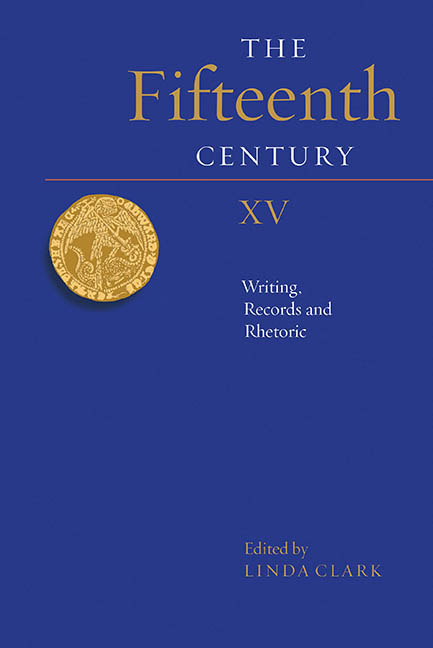Book contents
- Frontmatter
- Contents
- List of Illustrations
- Contributors
- Preface
- Abbreviations
- The Libelle of English Policy: The Matter of Ireland
- ‘Stories of Divers Regions and Provinces’: Some Digests of History and Geography for Late-Medieval English Readers
- ‘To please … Dame Cecely that in latyn hath litell intellect’: Books and the Duchess of York
- A Case Study in Lancastrian Service and Personal Survival: The Career of William, Lord Roos of Helmsley (c.1370–1414)
- Identity, Discourse and Political Strategy: Margrave Albrecht Achilles (1414–86) and the Rhetoric of Antagonism between Town and Nobility in Upper Germany
- The Redistribution of Forest Law and Administration in Fifteenth-Century England
- Well-Connected and Qualified Clerics? The Bishops of Dunkeld and Sodor in the Fifteenth Century
- Preaching Politics: Lancastrian Chancellors in Parliament
- Bishop John Alcock and the Roman Invasion of Parliament: Introducing Renaissance Civic Humanism to Tudor Parliamentary Proceedings
- Preaching on Magna Carta at the end of the fifteenth century: john alcock's sermon at paul's cross
- Index
- CONTENTS OF PREVIOUS VOLUMES
Preaching Politics: Lancastrian Chancellors in Parliament
Published online by Cambridge University Press: 23 August 2019
- Frontmatter
- Contents
- List of Illustrations
- Contributors
- Preface
- Abbreviations
- The Libelle of English Policy: The Matter of Ireland
- ‘Stories of Divers Regions and Provinces’: Some Digests of History and Geography for Late-Medieval English Readers
- ‘To please … Dame Cecely that in latyn hath litell intellect’: Books and the Duchess of York
- A Case Study in Lancastrian Service and Personal Survival: The Career of William, Lord Roos of Helmsley (c.1370–1414)
- Identity, Discourse and Political Strategy: Margrave Albrecht Achilles (1414–86) and the Rhetoric of Antagonism between Town and Nobility in Upper Germany
- The Redistribution of Forest Law and Administration in Fifteenth-Century England
- Well-Connected and Qualified Clerics? The Bishops of Dunkeld and Sodor in the Fifteenth Century
- Preaching Politics: Lancastrian Chancellors in Parliament
- Bishop John Alcock and the Roman Invasion of Parliament: Introducing Renaissance Civic Humanism to Tudor Parliamentary Proceedings
- Preaching on Magna Carta at the end of the fifteenth century: john alcock's sermon at paul's cross
- Index
- CONTENTS OF PREVIOUS VOLUMES
Summary
Political history is never straightforward, and the political history of fifteenth-century England is no exception. From William Stubbs's idea of a great constitutional experiment to K.B. McFarlane's emphasis on aristocratic and princely lordship, the Lancastrians have continued to provide a source of curiosity, uncertainty and debate, both as a noble affinity and as a royal dynasty. While literary scholars such as Jennifer Nuttall and Paul Strohm make a case for a distinct Lancastrian political identity based on contemporary literary sources, most historians remain unconvinced, preferring to stress the continuity of late medieval English politics over any perceived anomalous behaviour between 1399 and 1461, a debate that I shall briefly address at the end of this article.
Such a debate is certainly important, not just in understanding the Lancastrians themselves, but also in gaining a deeper appreciation of the broader political culture of fifteenth-century England and the development of political ideology in the later Middle Ages. However, it is not within the scope of the present article to explore this argument definitively or to make any ambitious claims. Instead, I would simply like to raise some fundamental questions about the Lancastrians and their political ideals through a close examination of one very important set of sources: the addresses or sermons delivered to the estates of the realm, usually by the chancellor, at the opening of each parliament.
Of course, historians have long used these addresses as source material, and some scholarly works have focused on them specifically, notably S.B. Chrimes's English Constitutional Ideas in the Fifteenth Century. For the most part, however, Chrimes gives only a dry sketch of each address, its orator, and the principal biblical references quoted (which he lists in a useful table), and any brief analyses are scattered throughout the book, not gathered into one cohesive section on parliamentary sermons. Indeed, although there are numerous publications concerning the medieval rolls of parliament, to my knowledge there have not been any significant works written explicitly on parliamentary sermons across the longue durée of later medieval English history. Nonetheless, the summaries of sermons included in the parliament rolls, the orators themselves, the biblical references used, and even the points specifically chosen to appear on the official record are all vital in illuminating the complex political ideals and ideological developments that underpinned the Lancastrian regime.
- Type
- Chapter
- Information
- The Fifteenth Century XV , pp. 125 - 144Publisher: Boydell & BrewerPrint publication year: 2017

